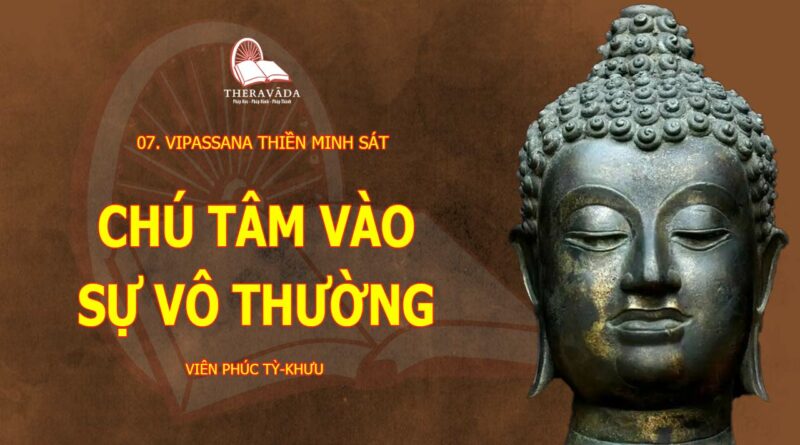Nội Dung Chính [Hiện]

Chú Tâm Vào Sự Vô Thường
Thiền Minh Sát có thể được xem như tiến trình phát triển một số tâm sở tích cực cho đến khi chúng đủ sức mạnh để hoàn toàn liên tục chế ngự tâm. Những tâm sở này được gọi là những năng lực kiểm soát hay Ngũ Căn. Ngũ căn bao gồm: Tín, Tấn, Niệm, Ðịnh và Huệ.
Thiền sinh phải quan sát các hiện tượng xảy ra với chủ tâm để ghi nhận và thấy rõ rằng mọi vật có sinh ra thì sẽ có hủy diệt hay mất đi. Chân lý này chỉ có thể được xác minh khi bạn thật sự quan sát một cách chánh niệm không chút hoài nghi. Ðây là thái độ rất quan trọng để chuẩn bị cho việc hành thiền.
Sự chấp nhận ngay từ lúc ban đầu rằng tất cả mọi vật đều vô thường và biến đổi giúp ta tránh được những phản ứng bất lợi có thể xảy ra khi ta thực sự khám phá ra chân lý này. Sự thật ở đời nhiều khi quá phũ phàng, ê chề; cho nên, nếu ta biết được định luật vô thường, thì khi gặp những nghịch cảnh này ta sẽ không có phản ứng bất lợi. Sự hiểu rõ bằng lý thuyết vô thường, khổ, vô ngã giúp ta có một sự chuẩn bị sẵn sàng để đương đầu với chúng khi ta thật sự thấy rõ chúng trong lúc hành thiền.
Bởi thế, ở giai đoạn khởi đầu, phải tin vào sự vô thường trước. Sự tin tưởng này mới đầu chỉ là lý thuyết xuyên qua sự học hỏi hay xem kinh sách. Về sau, khi việc hành thiền tiến triển và tâm định được đào sâu, khi chính mình kinh nghiệm về vô thường, khổ, và vô ngã thì sự tin tưởng này trở thành xác tín.
Trích: “Ngay Trong Kiếp Sống Này”. Thiền sư U Pandita, Tỳ kheo Khánh Hỷ dịch.
ATTENTION TO IMPERMANENCE
Vipassanā meditation can be seen as a process of developing certain positive mental factors until they are powerful enough to dominate the state of the mind quite continuously. These factors are called “the controlling faculties,” and they are five in number: faith, effort or energy, mindfulness, concentration, and wisdom.
Especially in an intensive retreat setting, proper practice develops strong and durable faith, powerful effort, deep concentration, penetrative mindfulness, and the unfolding of more and more profound insight or wisdom. This final product, intuitive wisdom or paññā;, is the force in the mind which cuts through into the deepest truth about reality, and thus liberates us from ignorance and its results: suffering, delusion, and all the forms of unhappiness.
For this development to occur, however, the appropriate causes must be present. Nine causes lead to the growth of the controlling faculties.
The first cause for development of the controlling faculties is to notice that everything which arises will also dissolve and pass away. During meditation one observes mind and matter at all the six sense doors. One should approach this process of observation with the intention to notice that everything which appears will, in turn, dissolve. As you are no doubt aware, this idea can only be confirmed by actual observation.
This attitude is a very important preparation for practice. A preliminary acceptance that things are impermanent and transitory prevents the reactions that might occur when you discover these facts — sometimes painfully — through your own experience. Without this acceptance, moreover, a student might spend considerable time with the contrary assumption, that the objects of this world might be permanent, an assumption that can block the development of insight. In the beginning you can take impermanence on faith. As practice deepens, this faith will be verified by personal experience.
From “In This Very Life” – U Pandita Sayadaw.

